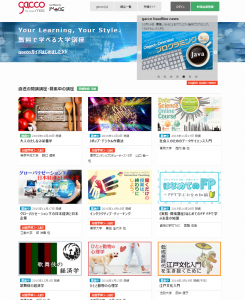The MOOCs are centered on North America, which took the lead in 2012, but there is a sense of crisis in non-English speaking countries that "if the US MOOCs dominate online education, higher education institutions in their own language may decline." Yes, JMOOC was opened in 2014 in France FUN, Spain Miriada X, and Japan, and K-MOOC was opened in South Korea in 2015.However, JMOOC currently has about 40 participating universities and a total of about 40 students, which is still small.The Ministry of Education, Culture, Sports, Science and Technology's Educational Rehabilitation Executive Committee has announced a policy of "promoting the strategic use of MOOC by universities", but the financial power of the Japanese government and Japanese universities, which are struggling with finances, will fight against universities around the world. It will be difficult to overcome.
[2] New external pressure to accelerate university selection Part 2 “Development of science and technology”
In addition to the evolution of the global INTERNET EDUCATION, there is the evolution of science and technology that drives the transformation of education.It is the evolution of automatic interpretation and virtual reality.First, let us consider the impact of the evolution of the automatic translation function on universities.This evolution is a change that breaks down the language barrier of higher education and makes it possible to take INTERNET EDUCATION in any language area without any discomfort.
Since many MOOCs are expanding mainly in English, they are beginning to develop MOOCs in their own language in non-English speaking countries.However, the rapidly evolving automatic translation function breaks down the barrier of not being able to learn the education of the country you want to learn because you cannot speak a foreign language. As part of its growth strategy, the Japanese government, which will celebrate the Tokyo Olympics in 2020, has been developing not only smartphone voice translation but also "highly accurate multilingual voice translation technology" as a national project since 2015. The idea is to appeal to the world as a technological innovation originating in Japan that eliminates the "language barrier."In response, each company will speed up the completion of automatic translators and realize the practical application of products that overcome multilingual language barriers without discomfort toward the Olympic Games.
In the not too distant future, even young Japanese who cannot speak foreign languages should be able to enjoy the evolved INTERNET EDUCATION overseas while staying in Japan.
Next, let us consider the impact of the evolution of virtual reality on universities.This evolution should develop into the feeling that even INTERNET EDUCATION is deepening learning in a real university (the campus itself may be virtual).The evolution of virtual reality will create a world where teachers, students, and students who are far from the classroom can learn from each other as if they were close to each other.
It is also true that there are many issues and counterarguments to the education and human resource development conducted at the current INTERNET EDUCATION.In particular, issues such as maintaining motivation to work on learning and communication development issues are regarded as problems.However, various efforts have been made such as development of a new e-learning system to overcome the problem, utilization of flipped classroom method and schooling, and combination with real lessons such as practical training and experiments, and verification of outcomes is continuing.The evolution of virtual reality is likely to overcome these challenges.This is because you can experience university life with students from all over the world and overseas faculty members while staying at home.
[3] New external pressure accelerates the selection of domestic universities
So far, I have been thinking about the impact of the evolution of INTERNET EDUCATION, the evolution of automatic translators, and the evolution of virtual reality on domestic universities.
These major functional changes in the education system may be the greatest external pressure that has to change the way Japanese traditional university education should be.Although the Central Council for Education's report decided to promote active learning, it is unlikely that the education of Japanese universities will change in a short period of time.
A society where globalization will continue to progress in the future.Which choice would you make in the future?

